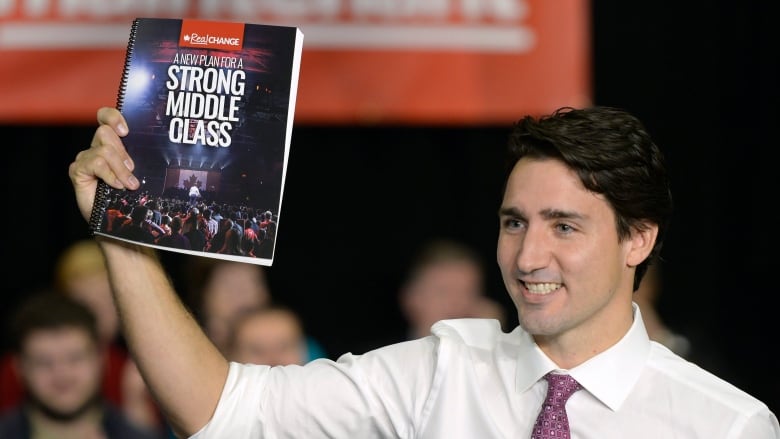Trudeau on emissions targets: no need for 'ambitious political numbers'
Liberal leader discusses environment, the niqab and Canada-U.S. relations on The House


Liberal Leader Justin Trudeau won't set a specific emissions reduction target despite being critical of the Conservatives' track record on fighting climate change.
"Everybody has thrown out numbers and different targets, and what they're going to do and what is going to happen," Trudeau told Chris Hall in an interview airing Saturday on The House.
"What we need is not ambitious political targets. What we need is an ambitious plan to reduce our emissions in the country."
If elected on Oct. 19, the Liberals have promised to invest $200 million each year to create strategies to support innovation and clean technologies in the forestry, energy and agricultural sectors, and invest an additional $100 million to support clean technology companies.
-
Justin Trudeau's environment plan: End fossil fuel subsidies, invest in clean tech
-
Justin Trudeau takes climate change question from event protesters
Trudeau said national emissions targets would be set after consultation with the provinces.
"The provinces have stepped up," he said. "What we need is federal leadership that works with them to actually reduce emissions."
But for now, no clear number is being offered as a target by the Liberals. Trudeau said that is an intentional move away from previous political responses to combating climate change.
"One of the things we've seen from political parties of all stripes — including my party in the past — is talking about targets on a political level, but not necessarily implementing a plan to achieve those targets," he said.
"Our number is $20 billion in investments in green infrastructure over the next 10 years," he added when pressed for a specific target number. "We're talking about $2 billion in a trust to help provinces make the shift to lower emissions. We're talking about hundreds of millions of dollars invested in green energy initiatives, in clean technology initiatives."
The NDP have pledged to establish a national cap-and-trade system and to reduce greenhouse gas emissions 34 per cent below 1990 levels by 2025, and 80 per cent by 2050. The Conservatives announced in May a commitment to reducing emissions by 30 per cent below 2005 levels by 2030, and the Greens are promising a 38 per cent reduction by 2025 with the ultimate goal of an 83 per cent reduction by 2050.
Liberals would work with U.S. on Keystone
A key plank of a Liberal environmental strategy would involve the United States, said Trudeau, who has spoken on the campaign trail about the "special" relationship between the two countries.
"There's an opportunity for us to work with our NAFTA partners and start addressing the energy and climate concerns people have," he said.
On the contentious topic of the Keystone XL pipeline, Trudeau admitted "there are a few things we disagree on."
Despite U.S. Democratic presidential candidate Hillary Clinton recently announcing her opposition to the pipeline, Trudeau said he is confident a Liberal government would "engage in a productive, non-ideological way with whoever ends up being President."
"We have a big relationship with the United States that goes far beyond any one industry or any one project," he said.
Both the Conservatives and Liberals support the construction of Keystone XL. New Democrat Tom Mulcair has said his support hinges on the pipeline carrying oil products refined in Canada instead of raw bitumen.
Niqab debate is 'not Canada'
Trudeau had his harshest words yet for Stephen Harper on the issue of the niqab in citizenship ceremonies.
Trudeau said the public debate over the niqab has become too heated.
"I'm actually going to say, again, to the Prime Minister directly — stop this, before someone truly gets hurt," he said.
"We've had women attacked in the streets for wearing hijabs and niqabs. This is not Canada, and the kind of leadership and divisive politics that he's playing is dangerous and irresponsible."
"What we need is governments that bring Canadians together, that reassure people rather than stoking up fears," he added. "Because fear makes us weak, not strong."
In an interview with CBC's Rosemary Barton, host of Power & Politics, Harper rejected the suggestion that recent assaults against Muslim women should stifle debate about the issue.
"I don't think you can use that kind of thing to discredit legitimate political debate," Harper said.
"Violence against women is unacceptable, which is why our government has brought forward laws to crack down on such violence."
Listen to The House's federal leader interviews from the campaign trail: